#dutch language vocabulary
Text
A comparison of some basic vocabulary in Germanic languages 💙
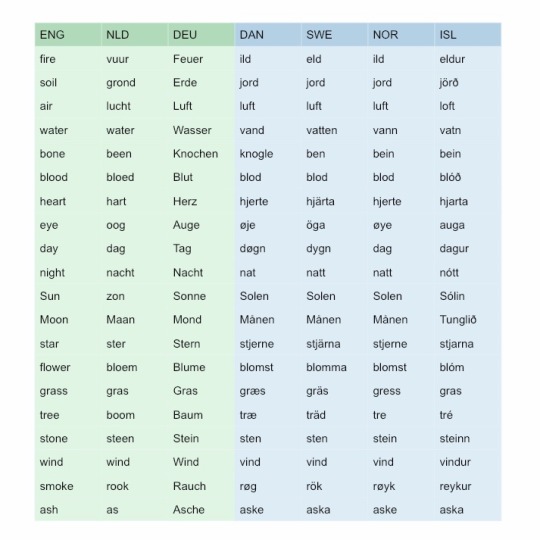
(left to right: English, Dutch, German, Danish, Swedish, Norwegian, Icelandic. West Germanic in green, North Germanic in blue.)
#language#linguistics#vocabulary#germanic languages#english#dutch#german#danish#swedish#norwegian#icelandic#fun facts#random facts#special interest
702 notes
·
View notes
Text
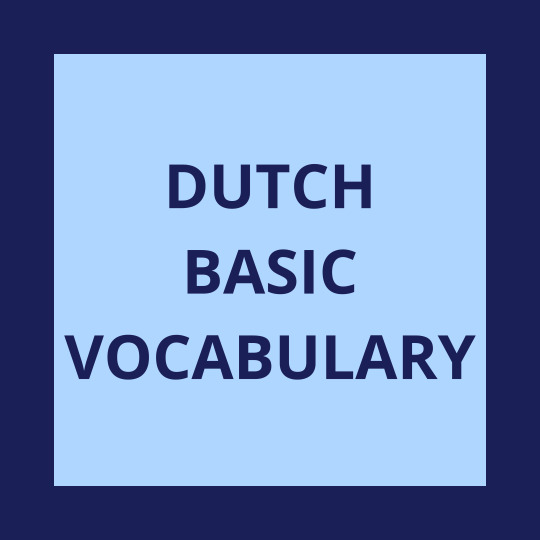

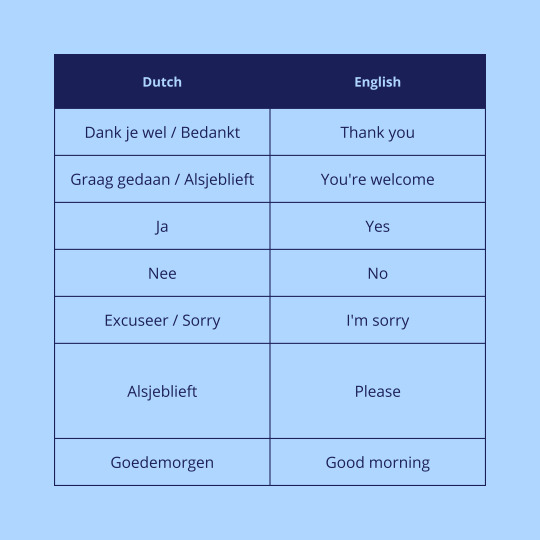
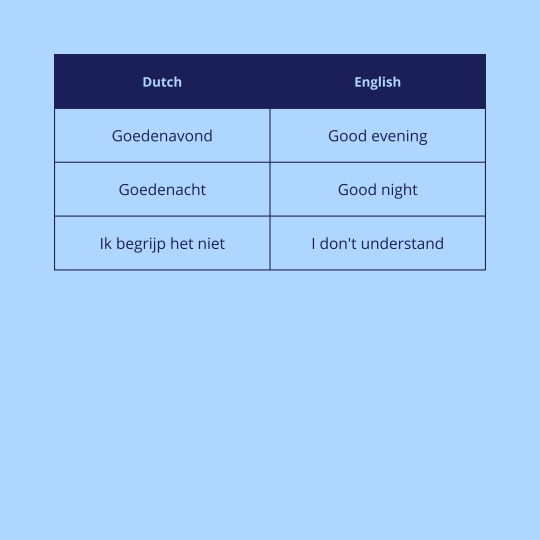
15 notes
·
View notes
Text
Today’s random Dutch vocab (4)
gangbaar — common
mettertijd — over time
toegeven (dat, separabel) — to admit (that):
Hij zich in bochten wringt om niet toe te hoeven geven dat hij er niet uitkomt
roet in het eten gooien — to ruin, to spoil, to throw a spanner in the works
in opmars zijn — to be on the rise
(de) benadering (van) — approach (to)
#random dutch vocab#dutch vocabulary#dutch vocab#learning dutch#dutch langblr#dutch#dutch language#langblr#nederlands
15 notes
·
View notes
Text
Masons Intro, Bienvenu! Welkom! いらっしゃい!

+ 17 | he/they | native English speaker
+ have been learning French on and off for 2 years and want to get better at pronunciation and grammar. my goals in French is too be more conversational and increase my fluency level this year. <A2>
+ complete beginner at Dutch, I like the way it sounds and I have hopes to move and study to The Netherlands in 2025.
+ I love the sounds in the Japanese and the history of Japan. want to get back into learning again stopped last September due to school.
If you are a Dutch/French/Japanese language learner please reach out I'd love to learn together an keep each other accountable. 🤗
#french#dutch#japanese#language#language learning#languagelover#grammar#polyglot#languageblr#multilingual#langblr#french learning#french langblr#french language#dutch language#dutch langblr#japanese langblr#japanese language#bilingual#vocabulary
9 notes
·
View notes
Text
My class was throwing a fuss about the English vocabulary. Mainly because it is so unnecessarally enormous. They were making a point of English having words for throwing people out of the window. For the ones unfamiliar with the word, that would be defenestration.
They became louder and louder, honestly I agree with that English has way to many different words and tenses but I was done, so were a few others. So I reminded them about this beautiful Dutch word we have. Swaffelen aka to slap your dick against something, anything really. They got quiet real fast after that.
3 notes
·
View notes
Text
Duolingo Alternatives by Language
Disclaimer: I haven't used or tested all of them. All resources have different strengths, e.g. Drops being designed for vocabulary. They often aren't full alternatives for Duolingo or formal classes. I just wanted to compile resources for all languages on Duolingo to make the switch easier, especially for the less popular languages.
Feel free to also check out my collection of free textbooks
If you want a more detailed resource list for any of these languages (or perhaps one not listed here) you can send me an ask and I can see what I can do.
Arabic
AlifBee
Arabic Unlocked
Beelinguapp
Bluebird
Busuu
Clozemaster
Drops
Infinite Arabic
Ling
LinGo Play
LingQ
Mango
Mondly
Qlango
Write It! Arabic
Catalan
Bluebird
Clozemaster
Drops
Ling
LinGo Play
LingQ
LyricsTraining
Mondly
Qlango
Chinese
Bluebird
Beelinguapp
Bunpo
Busuu
Chineasy
Clozemaster
Drops
Du Chinese
Hello Chinese
HeyChina
Immersive Chinese
Infinite Chinese
Ling
Lingodeer
LinGo Play
Lingopie
LingQ
Mango
Mondly
Pleco Chinese Dictionary
Qlango
Czech
Bluebird
Clozemaster
Ling
LinGo Play
Mango
Mondly
Qlango
Danish
Babbel
Bluebird
Clozemaster
Drops
Ling
LinGo Play
Lingvist
LingQ
Mango
Mondly
Qlango
Dutch
Babbel
Bluebird
Busuu
Clozemaster
Drops
Ling
LinGo Play
Lingvist
LingQ
LyricsTraining
Mango
Mondly
Say Something in Dutch
Qlango
Esperanto
Clozemaster
Drops
Esperanto12.net
Kurso de Esperanto
LingQ
Qlango
Finnish
Bluebird
Clozemaster
Drops
Ling
LinGo Play
LingQ
LyricsTraining
Mango
Mondly
Qlango
French
Babbel
Bluebird
Beelinguapp
Bunpo
Busuu
Clozemaster
Collins French Dictionary
Conjuu
Dr French
Drops
HeyFrance
Infinite French
Lilata
Ling
Linga
Lingodeer
LinGo Play
Lingopie
Lingvist
LingQ
Listen Up
LyricsTraining
Mango
Mondly
Nextlingua
Oxford French Dictionary
Qlango
TV5MONDE
Xeropan
German
Babbel
Bluebird
Beelinguapp
Bunpo
Busuu
Clozemaster
Collins German Dictionary
Conjuu
Drops
DW Learn German
Infinite German
Ling
Linga
Lingodeer
Lingopie
LinGo Play
Lingvist
LingQ
LyricsTraining
Mango
Mondly
Nextlingua
Oxford German Dictionary
Qlango
Xeropan
Greek
Bluebird
Clozemaster
Drops
Greek Alphabet Academy
Ling
LinGo Play
LingQ
Mango
Mondly
Qlango
Write It! Greek
Guaraní
Clozemaster
Guarani Ayvu
Haitian Creole
Bluebird
Mango
Hawaiian
Drops
Mango
ʻŌlelo Online
Hebrew
Bluebird
Clozemaster
Drops
Ling
LinGo Play
LingQ
Mango
Mondly
Shepha
Write It! Hebrew
High Valyrian
Valyrian Dictionary
Hindi
Bhasha
Bluebird
Beelinguapp
Clozemaster
Drops
Hindwi Dictionary
Ling
LinGo Play
LingQ
Mango
Mondly
Qlango
Hungarian
Bluebird
Clozemaster
Drops
Ling
LinGo Play
LingQ
Mango
Mondly
Qlango
Indonesian
Babbel
Bluebird
Clozemaster
Drops
Ling
LinGo Play
LingQ
Mango
Mondly
Irish
Bluebird
Clozemaster
Collins Irish Dictionary
Drops
Easy Irish
Ling
Mango
Teanglann
Italian
Babbel
Beelinguapp
Bluebird
Bunpo
Busuu
Clozemaster
Collins Italian Dictionary
Conjuu
Drops
Infinite Italian
Ling
Linga
Lingodeer
Lingopie
LinGo Play
Lingvist
LingQ
LyricsTraining
Mango
Mondly
Nextlingua
Oxford Italian Dictionary
Qlango
Japanese
Beelinguapp
Bluebird
Bunpo
Busuu
Clozemaster
Drops
HeyJapan
Hiragana Quest
Infinite Japanese
kawaiiDungeon
Ling
Lingodeer
Lingopie
Lingvist
LingQ
LyricsTraining
Mango
Mondly
Oyomi Japanese Reader
renshuu
Takoboto Japanese Dictionary
Todaii
Qlango
Write It! Japanese
Klingon
boQwl! Klingon Language
Klingon Translator
Write It! Klingon
Korean
Beelinguapp
Bluebird
Bunpo
Busuu
Clozemaster
Drops
Hangul Quest
HeyKorea
Infinite Korean
Ling
LinGo Play
Lingopie
Lingodeer
Lingvist
LingQ
Mango
Mondly
Qlango
Write It! Korean
Latin
Bluebird
Cattus
Clozemaster
Collins Latin Dictionary
Grammaticus Maximus
Latinia
Legentibus
LingQ
Mango
Mondly
Perdisco
Qlango
Vice Verba
Navajo
Navajo Language Renaissance
Navajo Language Program
Speak Navajo
Norwegian
Babbel
Bluebird
Clozemaster
Drops
Ling
LinGo Play
Lingvist
LingQ
Mango
Mondly
Mjolnir Norwegian
Norskappen
Qlango
Polish
Babbel
Bluebird
Busuu
Clozemaster
Drops
Ling
LinGo Play
Lingvist
LingQ
LyricsTraining
Mango
Mondly
Qlango
Portuguese
Babbel
Beelinguapp
Bluebird
Bunpo
Busuu
Clozemaster
Collins Portuguese Dictionary
Drops
Infinite Portuguese
Ling
Lingodeer
Lingopie
LinGo Play
Lingvist
LingQ
LyricsTraining
Mango
Mondly
Nextlingua
Qlango
Romanian
Bluebird
Clozemaster
Drops
Ling
LinGo Play
LingQ
Mango
Mondly
Qlango
Russian
Babbel
Bluebird
Beelinguapp
Busuu
Clozemaster
Collins Russian Dictionary
Drops
Infinite Russian
Ling
Linga
LinGo Play
Lingopie
Lingodeer
Lingvist
LingQ
Mango
Mondly
Nextlingua
Qlango
Write It! Russian
Scottish Gaelic
Bluebird
Clozemaster
Go!Gaelic
Mango
Spanish
Babbel
Beelinguapp
Bluebird
Bunpo
Busuu
Clozemaster
Collins Spanish Dictionary
ConjuGato
Conjuu
Drops
Infinite Spanish
Ling
Linga
Lingodeer
LinGo Play
Lingvist
LingQ
Listen Up
LyricsTraining
Mango
Mondly
Nextlingua
Say Something in Spanish
SpanishDict
Qlango
Xeropan
Swahili
Bluebird
Bui Bui Swahili App
Clozemaster
Drops
Ling
LinGo Play
LingQ
Mango
Nkenne
Swedish
Babbel
Beelinguapp
Bluebird
Clozemaster
Drops
Ling
LinGo Play
Lingvist
LingQ
LyricsTraining
Mango
Mondly
Qlango
Turkish
Babbel
Beelinguapp
Bluebird
Busuu
Clozemaster
Drops
Ling
LinGo Play
LingQ
LyricsTraining
Mango
Mondly
Qlango
Ukrainian
Bluebird
Clozemaster
Drops
Ling
LinGo Play
LingQ
Mango
Mondly
Mova Ukrainian
Qlango
Speak Ukrainian
Vietnamese
Bluebird
Clozemaster
Collins Vietnamese Dictionary
Drops
Learn Vietnamese with Annie
Ling
Lingodeer
LinGo Play
Mango
Mondly
Welsh
BBc Cymru Fyw
Bluebird
Clozemaster
Say Something in Welsh
Yiddish
Bluebird
Clozemaster
Mango
Proste Yiddish
Roni Gal Learn Yiddish
Vaybertaytsh
Yiddish Book Center
Zulu
Bluebird
Nkenne
Bonus: Polygloss which claims to be available for all languages as long as there is another user also learning the same language
6K notes
·
View notes
Text
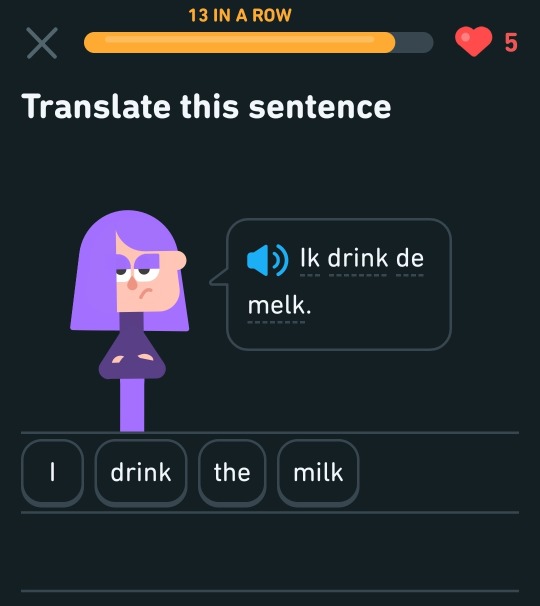
I love how Dutch and English share just enough vocabulary that every once in a while you'll get a perfectly cromulent sentence in one language that looks like a shitpost in the other
3K notes
·
View notes
Photo

Indoeuropean languages in Europe
Historical Roots: The Indo-European language family is believed to have originated in the Eurasian Steppe around 4000-2500 BCE. From there, groups of speakers migrated to various parts of Europe, contributing to the linguistic diversity of the continent.
by hunmapper
Language Diversification: Indo-European languages in Europe have evolved into numerous branches and sub-branches. Some of the major branches include:
Romance Languages: Descendants of Latin, including French, Spanish, Italian, Portuguese, and Romanian.
Germanic Languages: Including English, German, Dutch, Swedish, and others.
Slavic Languages: Such as Russian, Polish, Czech, and Bulgarian.
Celtic Languages: Including Irish, Scottish Gaelic, and Welsh.
Hellenic Languages: Mainly Greek.
Baltic Languages: Such as Lithuanian and Latvian.
Indo-Iranian Languages: Including Hindi, Bengali, and Persian.
Cultural Significance: Indo-European languages have played a pivotal role in shaping European culture, history, and literature. Greek and Latin, for instance, have had a profound influence on science, philosophy, and the development of the Roman Empire.
Language Revival: Some Indo-European languages in Europe, such as Irish and Welsh, have experienced language revival efforts in recent decades. These efforts aim to preserve and revitalize languages that were declining in usage.
Language Contact: Due to centuries of contact and migration, many Indo-European languages have borrowed words and phrases from each other. This phenomenon, known as linguistic borrowing, has enriched the vocabulary and expressions of these languages.
182 notes
·
View notes
Text
How to write a bilingual character
Plenty of characters across fandoms are multilingual. This is for those writers who feel like writing König, Nikto and whoever else. As polyglots ourselves, @sarapaprikas-blog and I figured this could be helpful for writing English-German or English-Russian bilinguals.
At the beginning we need to point out that writing bilinguals is not just a question of adding a few words from different languages but about a deeper understandings of language. So be warned, a lot is about grammar. fun grammar. frammar!
English-German Bilingual
Continental German speakers tend to be taught British English in school meaning often this is the basis of English knowledge and pronunciation. However, a lot of Internet slang with American English and AAVE mixes in, with most speakers not being aware of it. So mixing that up in your writing is one way to show the contemporary English-German bilingual (who possibly hangs out online too much).
Further, English and German share a lot of structural similarities as both are part of the Germanic language group. However, one key difference is sentence structure. English tends to go 1. Subject, 2. Predicate, 3. Object with indicators of time and space coming before or after that construct. German syntax is more flexible (or complicated if you will). Which is why the regular German speaker just nods wisely reading this, while the regular English speaker has no idea about grammar and is googling English syntax right about now. Fluent speakers of that combo tend to build really complicated and possibly wrong sentences in English which feel off but are understandable. Less fluent speakers will stick to the most basic syntax (with a lot of uhhhms and ahhhs in between).
This habit of being extra also shows up in the use of tenses. Both German and English have a wide variety of tenses and time forms to express who will or had done what or is about to do in the future or past or was planning to do or whatever. You get it. Spoken German does that a lot. British English does a bit less of it. And American English tends to be even less so in spoken form. The English-German could be written as that person who builds really complicated (and possibly unnecessarily and precise) tenses into their expressions. Basically think of a character who tries to express a very precise order of events instead of just saying "I took a shit".
Speaking of shit, German has more curses than “Scheiße”. Get creative, sarcastic and mean. Use backhanded compliments and wordplay to mirror German curses like “Backpfeifengesicht” (= A face that looks like it needs to be slapped), “Geringverdiener” (= highly ironic, someone who has a supposed low-paying job), NPC (= non-playable character), “Hund” (= dog, mutt), …
As German and English share not just grammar but also a history of cultural exchange and a lot of Germans moving to the US in the beginning of the 20th century, there is a lot of shared or similar vocabulary. E.g. the word house in English corresponds with the German Haus. So do all these words. Saying a word with German pronunciation that is very similar to the English one, can slip into the bilinguals expressions very easily. This works the other way around as well. Also, some expressions made it from German into English so a bilingual might opt to pronounce e.g. "Gesundheit" in German while speaking English.
Speaking of similarities, Yiddish and Pennnsylvania-Dutch, while being languages on their own, are very similar to German so a bilingual German might opt to pronounce words from those languages at least "more correctly" that the regular English speaker could do without practice. Those languages are also somewhat understandable to German speakers. So your bilingual character can hold a short and somewhat minimal but working conversation with someone speaking Yiddish or Pennsylvania-Dutch. It might also include a lot of desperate hand gestures and slowly repeating words tho. They are still different languages after all.
In regards to pronunciation. There is no TH in German so plenty of late learners have a hard time with that. Yes, that's where the "zhe" instead of "the" comes from. If your bilingual learned both languages from a young age they will not have difficulty pronouncing TH unless they switch between languages quickly or are stressed & tired.
German is famous for having super long and precise words. Let me tell you a secret: It's not really true. German just allows compounding of words, meaning to put words together to create more precise ones. Plenty of languages do that, including English. Just maybe not as much. A bilingual might opt for using the German compounding system as it is very flexible and can create precise and expressive words on the fly. Your English-German bilingual might then attempt translating this one word into English for possibly hours without ever having a satisfying solution.
Lastly, German speakers don't just come from Germany. The German Sprachraum is bigger than that. And while it might not impact speech patterns that much, it's culturally tactful to know the differences between German-speaking identities one writes about.
English-German bilingual characters can come in a wide variety. And some might speak very basic English. But plenty of English-German speakers are fluent in English. Their mistakes don't come from a lack of English knowledge but from a clash between two similar language systems. To write a fluent bilingual means not to just add "Ja" and "Nein" while making their expressions poorer but on the contrary having an over expressive character with language flaws and quirks.
English-Russian Bilingual
Thanks to Hollywood there is a certain cliche accent for English-Russian bilinguals we dubbed the shitty Russian accent. And while obviously it’s possible that someone out there speaks like that, most fluent English-Russian bilinguals don’t sound like their offensively orientalised depictions. English has been taught very regularly in Russia or generally Eastern European schools along with other languages for decades. Plenty of native Russian speaking people live abroad for a while or migrate, giving them a lot of speaking practice. And of course Russian speakers have access to English speaking media, so they practice a lot by just watching youtube or whatever. The shitty Russian accent is something to be avoided or requires serious legitimization in character design before it’s use as most English-Russian Bilinguals that are fluent enough to be active characters in someone's English writing would not sound like that.
It's also important to point out that plenty of characters get labeled as “Russian” but there are a lot more languages, cultures and identities that are not Russian, do not consider themselves as such or do not natively speak Russian. It's also important that those who speak Russian or hold Russian nationality can have much more complicated identities. This is especially important as the blond, blue-eyed ethnically Russian archetype is part of an old stereotype which excludes plenty of the Russian minorities, or pressures people into a harmful white/slavic stereotype. Please be mindful of that when doing character design.
Similar to continental German-speakers, most Russian speakers tend to learn British English in school with huge influences from American English and AAVE coming through English speaking media and ✨the Internet✨. And just like English-German bilinguals, plenty of English-Russian bilinguals may not always be aware of the differences and use.
Russian and English are not as closely related as German and English because unlike the indo-germanic English, Russian is a indo-Slavic language. That means less shared vocabulary and grammar. However, plenty of vocabulary made it into Russian from both English and German as there is a history of linguistic and cultural exchange. This is especially the case with technical and professional vocabulary. Your bilingual character could choose corresponding English, German or even Latin academic vocab pronouncing it Russian depending on their profession and walk of life, as those tend to be the areas of expertise people have extra knowledge in. (Ever heard of an Awtomobil?)
Russian is a highly flexing (💪😏) language meaning it relies heavily on the inflection of verbs to communicate. As such, it is much less restrained in its syntax than English and it is entirely possible to build a sentence out of one verb (fuck yeah, peak minimalism). But what sounds very elegant and pointed in Russian, translates extremely poorly into English (;_;). Hence, less fluent English-Russian bilinguals will likely build very short somewhat stilted sentences in English: ‘I am hungry. You make food. I Love you.’. And while more fluent speakers will compensate due to practice and the difference vanishes, Russian could still be your character's preferred language due to its elegant and quick phrasing attributes. It’s like with the Latin veni, vidi, vici - its translations only do it half justice.
Speaking of verbs - as Russian relies on a number of verbs to communicate active, passive, finished, unfinished, tense and even gender of the corresponding nouns, a bilingual English-Russian speaker might struggle expressing the same thing with the English less grammatically loaded verbs or at least stress the importance of the verb. Imagine what it feels like to express yourself in English just saying “do”, “go” or “make” when those words tend to have 10+ other verbs saying variations of the same thing in Russian depending on the context, massively changing its meaning if you choose the wrong one. Suddenly you are not walking home, you are having a whole adventure! Naturally, putting emphasis on the right verb could be a telltale sign of your English-Russian bilingual character.
Adjacent to that - Russian differs in its use of auxiliary verbs. Making mistakes with be, do and have or just forgetting to add them when combined with other verbs could be a tell on a practicing bilingual character. (hurray, another note on verbs! It’s as if verbs in Russian are really important, huh?)
Another aspect that could influence your character's speech pattern is the Russian mode of negation. In Russian to say you are not doing something, works with the pattern of NO + VERB instead of the English DO + NOT (also known as do not / don’t). That means to say ‘i do not understand this grammar thing’ as a totally hypothetical bilingual character could go as ‘I not understand this grammar thing’. As you can see the ‘not’ is just put before the verb, making it sound odd. Combined with difficulty with the auxiliary verbs, it’s a classic mistake a bilingual character could make.
Enough about verbs and grammar. Famously, Russian pronunciation uses a bunch of sounds that are unusual for English speakers. Most importantly it’s the trilled R, similar to the Spanish trilled R, which can sneak into your character's pronunciation and is hard to lose. So if your character learned English later in life, they will likely have at least some version of the trilled R while a bilingual who spoke both languages from an early age will be able to switch between both Rs (and maybe sneer at everyone who can’t do both. ha, peasants. can’t even do two R sounds.)
Russian is not written with the same alphabet as English. Russian uses the Cyrillic alphabet unlike English, which uses a Latin-script. And while some letters look similar, they tend not to correspond. However, the uninitiated may not know the difference and try to read (and fail). Stories with bilingual characters or surroundings can use that for storytelling purposes. Also, one thing is to learn to speak a language but another is to read and write it, especially with the added difficulty of a new alphabet. Written cursive Russian has another feature, which makes it harder for the unpracticed to read it quickly - while looking very pretty it looks potentially like this.
Just like with the English-German bilingual, there is a wide variety of possibilities on how to create an English-Russian bilingual character. If you need help understanding what the Term Russian included, read here.
#grimmwriting#sarapaprikasblog#könig#könig call of duty#call of duty#call of duty modern warfare 3#nikto#cod nikto#writing#creative writing#call of duty nikto#call of duty 3#call of duty modern warfare 2#call of duty modern warfare#nikolai belinski#nick cod#nik cod#sebastian krueger
83 notes
·
View notes
Text
I just had the age old discussion again with a few Dutch classmates. It was about a phrase Dutch people often throw out there: "Dutch is an ugly language." And every time I hear it my heart breaks. Not that I didn't agree with it when I was younger, but I do now realise how wrong I was.
The argument people bring most often is that it just sounds ugly and funny. But I think what people deem ugly about Dutch is exactly why it's such a beautiful language. We are generally seen as a very direct (or rude) people, not beating around the bush but talking about things exactly as they are. This could also be why Dutch people gravitate towards English so much, where you have so much choice in vocabulary that you can usually find a beautiful and poetic way to phrase things and make it "artistic".
But when you then translate those English sentences back to Dutch they sound super weird, and people then claim it's because Dutch is a broken language. But I think there's a strength to every language and as long as you lean into that you can create such profound things.
My favourite example is from a line from a Dutch song by Racoon from this Dutch album.
Spijt is iets voor later, maar dan ben je bijna dood
If you translate it you get something like "Regret is something for later, but then you're almost dead." it just sounds weeeeiiird. I feel like the second part of that line sounds especially bizarre, but then again, I'm not a native English speaker so I can't truly know.
But the Dutch example feels perfectly normal; it's raw and genuine, and this is where Dutch as a language excels. Tap into your emotion, lay them bare and sing about them. I don't know if this rawness makes people uncomfortable, but it seems like Dutch art requires a level of vulnerability for it to sound genuine, and perhaps that is why it can be confrontational? I'm not sure, these are just some thoughts that I had to get out there. I'll probably write up something more coherent later. Maybe I should start sharing more Dutch art and get people interested in the language.
Regardless this is why I don't believe that we will ever stop learning languages even with the rise in translation software. You can translate factual information perfectly, but emotions do not carry over cleanly. I mean I'm living in Japan right now partly because I want to truly understand haiku and Japanese literature. It's why I read English authors in English, and Dutch authors in Dutch, even when the English translation is more popular.
Just, Dutch can be beautiful if you're open to it. We Dutch people are very good at being spineless, but straighten those backs and write a poem or something, you'll feel better afterwards.
129 notes
·
View notes
Text

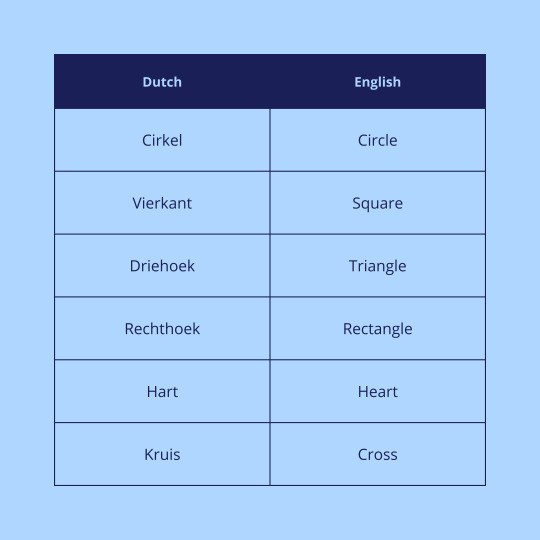
0 notes
Text
Today’s random Dutch vocab (2)
bedekken — to cover
blootgeven — to reveal
beheersen — to own, govern, master
(de) opeenstapeling — pile, amassment
(het) verraad — treachery
(het) onheil — disaster, trouble
dateren uit — to date back to
de eerste sporen treffen — to lay foundations, to begin, to take the first steps
in een notedop — in a nutshell
van een voorschot groot — tiny
Wist iemand veel dat… ? — Little did somebody know that…
in de waan verkeren dat… — to labour under the delusion that…
#random dutch vocab#dutch vocabulary#dutch langblr#dutch language#nederlands#dutch#langblr#learning dutch
11 notes
·
View notes
Note
“… as though Deaf people haven't been calling for Sign to be taught in schools. As though a Deaf person being entirely isolated in everyday hearing society unless they have an interpreter with them is less offensive than a hearing person being able to use BSL.”
I think I missed that prt of the post when I first saw it but I definitely read it now.
I did a sign language course in the last quarter of 2022 because I have a deaf coworker, while she can read lips, it is definitely not easy for her. Sign language is difficult for me because Dutch sign language relies fairly heavily on facial expression and mouthing the corresponding word to a sign when I am Very Much Autistic, but I figured could try.
And guess what? My coworker was SUPER STOKED that I’d do that! She apparently told like half the deaf social circle in my area that I was learning it! I have a vocabulary of ~180 words but she’s still really happy that I’m making an attempt at communicating on her level and she even bought me flowers that she handed to me at the graduation ceremony.
You have literally nothing to lose learning sign language and everything to gain.
This is incredibly sweet! And yes, I'm not surprised. There is no earthly acceptable reason whatsoever that we don't teach regionally-appropriate Sign languages in schools, and I actually saw a fascinating documentary a few years back about how BSL campaigners were studying the Welsh Model for how to improve countrywide access to BSL.
I'm currently looking into BSL courses for a similar reason, actually - right now my university is putting me through a PCET, which is standard procedure for lecturers who don't have one. One of the women on my course is Deaf-Mute, and has an interpreter to attend. This course is going to last two years, so I'd really love to be able to directly converse with this woman by the end, even if only in a limited way. But also, my grandmother was extremely hard of hearing in her old age, and my mother is now starting to lose some registers. I think it's probably a fair bet, just from a purely selfish stand point, that I'll go the same way. Is it not better to learn now? I'll likely need it eventually. To link to the original discussion, I'd certainly want to find a teacher who is Deaf rather than a hearing one, because they're the people whose language I'm trying to learn, but yeah beyond that, the description of learning Sign being cultural appropriation is just... damaging to absolutely everyone, tbh, including every community who still needs to discuss actual cultural appropriation.
230 notes
·
View notes
Text
Urgh I hate it so much when I see people say "I guess german people werent shocked when darth vader revealed himself as lukes father, because vader means father in german" and then I as an actual born german who lived her whole life in germany points out to them "ahm no, actually the word "vader" doesnt even exist in the german vocabulary. "Vader" doesnt mean ANYTHING in german, because the word doesnt exist. The german word for father is vaTer and its pronounced completly different then vaDer."
And then this people try to correct you the actual german and say you "DONT EVEN KNOW YOUR OWN GODDAMN MOTHERLANGUAGE and everyone knows that vader means father in german" and I as an actual born german point out: "no, vader is DUTCH for father but even they pronounce it different. The name vader comes from the english word "invader".
And THEN they dare to say that german and dutch is THE SAME FUCKING LANGUAGE?!?! Dude, germans and dutchs cant even understand each other, except maybe a few similar sounding words!!!! Like, really???
37 notes
·
View notes
Text
You didn't know the prompt but you voted Arthur for some angst.
Hope you're ready for some feels

Sitting at his desk, staring out the window. It's the beginning of spring. Flowers are sprouting. Trees are beginning to regrow their leaves. But even with how beautiful it is outside, he can't seem to enjoy it.
For being a man who is never left speechless, he couldn't tell you exactly how he feels. His vocabulary is wide, and in more than just one language. He knew English, French, and German while he was alive, and now he's begun to learn Dutch and Japanese. You would think he would be able to tell you how he feels.
It's 1897. He could go back to being happy he could go back and see her before she dies. Tell her how much he loves her. Maybe he still had time to stop it from falling apart.
Louisa was his first love. She's still alive. She's suffering with tuberculosis, but she still has many years left to live. Too many actually, considering what happened.
He taps his pen against his desk. The tip leaves small dots of ink on his paper. The pen is dropped and he takes his glasses off to rub his face.
He could go see her. Go see his kids. Tell them how much he loves them. He always loved them. But he didn't show it enough.
It's not that long of a trip. Plus he knows they are all back in England. Which means any day now she will come into his life.
Arthur takes a deep breath and forces himself from his desk. Stretching and trying to think about anything else. Literally anything else.
"Maybe I could go to England... Just for a bit."
He was in the kitchen now making a cup of coffee. What he needed was sleep, not to keep himself up.
He gripped the counter, his knuckles turning white. "I could make sure we all stay happy. I could..."
He seems to finish the sentence in his head, or even starts to have a little argument with himself. "But...I love Jean."
He quickly got snapped out of his thoughts.
"You love Jean?"
It was Theo. As much as he loved Theo, he wasn't the person he needed right now.
"It's nothing. Just a woman I knew from England," he sighs and grabs his mug wanting to hurry back to his room.
"Not so fast, straathond," Theo grabbed his arm to stop him from going anywhere. "Who is she? It's not like you to get hung up on a woman."
He was right. But Jean was different. It was love at first sight. Only, he was already married.
Arthur shakes him off. He wasn't going to understand. How could he? "It's not my issue any longer," he goes back to his room and sits back at his desk.
He zones out for a few minutes before opening a drawer and pulling out a wooden box. Inside were photos and papers from when he was still alive. Oddly enough some of the dates hadn't even passed yet. Some of these photos hadn't even been taken yet.
"If we had stayed in Switzerland for just a little longer..."
He was looking at a photo of Lousia and their two kids. Did his kids even come to his funeral after the way he treated them?
The sight of a single tear landing on the photo snapped him out of it. He turned the picture over and set it on down.
"I need to make things right," he wipes his hand across his face to make the tears go away.
But how? He can't just go to England and walk into their house. The real Arthur is almost 38, and vampire him? Well he looks to be at least a decade younger. Even he can tell he won't be able to pass as himself right now. But he also suspiciously looks too much like himself
"I could...," he pauses to think. "No. But I could-! No." So many thoughts are racing through his head. Should he make sure he never meets Jean? Maybe he should find her first. Maybe slap himself and tell him that he has a wife that he lives at home, and how she loves him.
"That would be a weird interaction, now wouldn't it?"
He sips his coffee and looks down at his paper and pen. It's now covered in ink splotches.
She has so much time left. Not nearly as little as the doctors anticipated. Almost a whole other decade.
Comte would kill him if he went to England and messed with history. He's a famous writer after all. It's not messing with the life of a nobody.
His kids hate him. It's not like he blames them. He chose Jean over his own kids, sent them to boarding school and didn't even want to see them on holidays. Told them they would have to find their own way home for the holiday rather than lending them money.
With his elbows on the desk, and his hands in his hair, his feelings start pouring out of his eyes. He wants to go back and change it. He wants to spend time with his kids. Spend time with Louisa. Tell them all how much he loves them. Tell them that he messed up and he regrets it. That he would do anything for them now.
But ..does he?
Does he regret it?
That's where the feelings are really coming from. Because as much as he wishes he had treated his kids better, he loved Jean. No. He loves Jean. He still has feelings for her to this day.
But what about Louisa? Yes he loves her. But is it stronger? For nine years while she was sick in bed, assuming she could pass any day, he was out with Jean. Going out to dinner with her. Meeting her in hotels.
Would it be fair to stop himself from meeting Jean?
He tries to straighten himself out. He uses the cuff of his shirt to soak up the tears. There's too many this time. The paper beneath him is ruined but he doesn't care. He picks up his pen and starts writing, being careful of all the wet spots.
For once since he's been revived he pours his heart out. The tears don't stop rolling down his cheeks, but he doesn't stop writing.
He writes a few pages, not quite sure of when to stop. But after what felt like hours he finally puts his own down. He's not even going to reread what he wrote. He can't.
He searches through his desk for envelopes. He needs three. The same address goes on each of them, but the names are different. After putting each letter where it goes he hesitates closing them.
When should he send them? They don't even know what he's apologizing for. The affair hasn't even started yet. But should he wait until Louisa has mere days left? Weeks? Months? Would they think it is some kind of prank?
He finishes off his coffee and gets up, taking the letters with him. Another debate is in his head.
Comte knows about his life and everything that happened. He doesn't know how, but he does. But Theo is his best friend, even though he doesn't know a fraction of his life.
He lets his feet lead him where he needs to go. He doesn't even realize how dark the mansion is. How the sun has gone down. He is looking down at the envelopes as he walks. No clue where he is going until he stops.
He looks up and it's Theo's door. His best friend. He would trust him with his life. He takes a deep breath and wipes his eyes again before knocking on his door.
"Theo?" he finally realized how late it is. He could be asleep.
Just as he is about to walk away from the door, it opens. "This better be good stra-" he stops when he sees how red Arthur's eyes are. How his cheeks are a little wet. "Arthur, what's wrong?"
He's clearly had gotten out of bed to answer the door.
"I need you to do something important for me," he holds out the letters. "These need to go to England," he pauses for a moment, nearly choking on his tears. "To Louisa and my kids."
"Arthur what are you -" he gets cut off.
"I need you to send them when the time is right. Louisa only has nine years left."
Theo wanted to ask so many questions. He's never seen Arthur like this. What happened? Theo slowly reaches out and takes the envelopes, noticing that they aren't shut.
"I don't-"
"Please, Theo," he's doing his best to keep his cool. It's not going well. "Don't tell me when you send them. I want to leave it in the past."
Looking up from the letters, he looks at Arthur and nods. "Okay. I will."
He didn't know how else to reply to taking on this task. He doesn't even know the situation to know when would be a good time. They aren't shut, does he read them? Is that why he didn't shut them?
"Thank you," Arthur says nothing else and walks back down the hall to his room. He closes his door and falls into the couch in his room, not even thinking about turning his desk lamp off.
"There's nothing else you can do, ol' chap."
~~~
~~~
Writer notes: I started this in March when I was doing a bunch of polls. For this one I had you chose the guy, and kept the prompt a secret.
I did a DEEEP dive into Arthur and I didn't realize the affair was THAT long so then I wasn't too sure how to write this. I knew he was married twice but I didn't realize how the second came to be, or that Louisa was dying the whole time.
I wasn't sure how to make him feel regret bc he really did love Jean, but he also really loved Louisa.
ANYWAY I HOPE YOU ALL ENOYED.
The other options for this prompt were Vincent, Mozart and Dazai. I might do one with Vincent because I already used this prompt neither Theo.
#ikevamp#ikemen vampire#ikevamp arthur#i started this in march when i was doing sll those polls#i kept the prompt to myself snd had you choose between some if the guys#HOPE YOU ENJOY
64 notes
·
View notes
Text
Resource List for Learning Dutch
Hi Language Enthusiasts,
Do you want to learn Dutch but don't know where to start? Then I've got the perfect resource list for you and you can find its links below. Let me know if you have any suggestions to improve it. I hope everyone can enjoy it and if anyone notices any mistakes or has any questions you are free to PM me.
Here is what the resource list contains;
Handmade resources on certain grammar concepts for easy understanding.
Resources on learning pronunciation.
Websites to practice reading.
Documents to enhance your vocabulary.
Notes on Colloquial Language.
Music playlists
List of podcasts/audiobooks And a compiled + organized list of websites you can use to get hold of grammar!
https://docs.google.com/document/d/1jbhBehQ-_llP1l2ZicCwRaLsFWMZy1mELcSgbZ9VZS8/edit?usp=sharing
#learn dutch#dutch#nederlands#netherlands#studyblr#language#languages#language learning#dutch language#dutch langblr#dutch lang#amsterdam#linguistics#learn#learning dutch#dutch learn#study#study blog#linguistique#linguist#language resources#grammar#pronunciation#etymology
366 notes
·
View notes